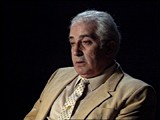<< Previous | Displaying results 2321-2330 of 6705 for "" | Next >>
-
Historian Peter Black describes the potential of legal consequences
Oral HistoryIn the 1980s and 1990s, historian Peter Black worked for the US Department of Justice Office of Special Investigations, as part of a team tracking and prosecuting suspected war criminals. Black later served as the Senior Historian at the United States Holocaust Memorial Museum.
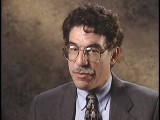
-
Esther Raab describes the arrival of transports in Sobibor
Oral HistoryEsther was born to a middle-class Jewish family in Chelm, Poland. In December 1942, she was deported from a work camp to the Sobibor killing center in occupied Poland. Upon arrival at Sobibor, Esther was selected to work in a sorting shed. She sorted clothing and the possessions of the people killed at the camp. During the summer and fall of 1943, Esther was among a group of prisoners in the Sobibor camp who planned an uprising and escape. Leon Feldhendler and Aleksandr (Sasha) Pechersky were the leaders…
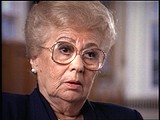
-
Historian Peter Black describes the importance of legal consequences
Oral HistoryIn the 1980s and 1990s, historian Peter Black worked for the US Department of Justice Office of Special Investigations, as part of a team tracking and prosecuting suspected war criminals. Black later served as the Senior Historian at the United States Holocaust Memorial Museum.
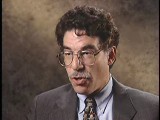
-
Peter Black describes why it is important to continue pursuing justice, even decades after the events
Oral HistoryIn the 1980s and 1990s, historian Peter Black worked for the US Department of Justice Office of Special Investigations, as part of a team tracking and prosecuting suspected war criminals. Black later served as the Senior Historian at the United States Holocaust Memorial Museum.
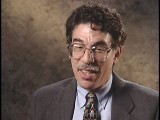
-
Emanuel Tanay describes the establishment of the Miechow ghetto
Oral HistoryEmanuel and his family lived in the small town of Miechow, north of Krakow. After Germany invaded Poland in September 1939, persecution of Jews increased. The Germans established a ghetto in Miechow. Emanuel was forced to live in the ghetto. Emanuel, his mother, and his sister escaped from the ghetto before it was destroyed in 1942. He stayed in a monastery, under an assumed identity, along with members of the Polish underground. Emanuel left the monastery after about a year when a teacher began to suspect…
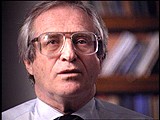
-
Leah Hammerstein Silverstein describes starvation in the Warsaw ghetto
Oral HistoryLeah grew up in Praga, a suburb of Warsaw, Poland. She was active in the Ha-Shomer ha-Tsa'ir Zionist youth movement. Germany invaded Poland in September 1939. Jews were forced to live in the Warsaw ghetto, which the Germans sealed off in November 1940. In the ghetto, Leah lived with a group of Ha-Shomer ha-Tsa'ir members. In September 1941, she and other members of the youth group escaped from the ghetto to a Ha-Shomer ha-Tsa'ir farm in Zarki, near Czestochowa, Poland. In May 1942, Leah became a courier…
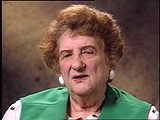
-
Blanka Rothschild describes the role of sharing and friendship in surviving the Lodz ghetto
Oral HistoryBlanka was an only child in a close-knit family in Lodz, Poland. Her father died in 1937. After the German invasion of Poland, Blanka and her mother remained in Lodz with Blanka's grandmother, who was unable to travel. Along with other relatives, they were forced into the Lodz ghetto in 1940. There, Blanka worked in a bakery. She and her mother later worked in a hospital in the Lodz ghetto, where they remained until late 1944 when they were deported to the Ravensbrueck camp in Germany. From Ravensbrueck,…
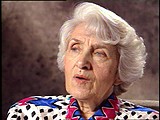
-
Charlene Schiff describes a clandestine school for children in the Horochow ghetto
Oral HistoryBoth of Charlene's parents were local Jewish community leaders, and the family was active in community life. Charlene's father was a professor of philosophy at the State University of Lvov. World War II began with the German invasion of Poland on September 1, 1939. Charlene's town was in the part of eastern Poland occupied by the Soviet Union under the German-Soviet Pact of August 1939. Under the Soviet occupation, the family remained in its home and Charlene's father continued to teach. The Germans…
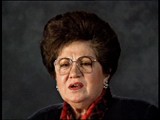
-
Charlene Schiff describes children smuggling food into the Horochow ghetto
Oral HistoryBoth of Charlene's parents were local Jewish community leaders, and the family was active in community life. Charlene's father was a professor of philosophy at the State University of Lvov. World War II began with the German invasion of Poland on September 1, 1939. Charlene's town was in the part of eastern Poland occupied by the Soviet Union under the German-Soviet Pact of August 1939. Under the Soviet occupation, the family remained in its home and Charlene's father continued to teach. The Germans…
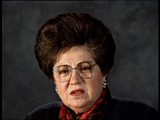
-
Sam Itzkowitz describes forced labor in the Makow ghetto
Oral HistoryThe Germans invaded Poland in September 1939. When Makow was occupied, Sam fled to Soviet territory. He returned to Makow for provisions, but was forced to remain in the ghetto. In 1942, he was deported to Auschwitz. As the Soviet army advanced in 1944, Sam and other prisoners were sent to camps in Germany. The inmates were put on a death march early in 1945. American forces liberated Sam after he escaped during a bombing raid.
